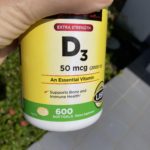In an article published by the National Institutes of Health, William Simonson, PharmD, says “vitamin D may potentially play an important role in preventing or ameliorating the multi-system consequences of COVID-19 infections. The role of vitamin D in COVID-19 is highly speculative as is the case with many potential treatments since the virus is so new to us. But, there is a sound reasoning behind this speculation.”
The article goes on to explain that one of the problems with COVID-19 is sometimes an over-reaction of the immune system, whereas vitamin D can help. T regulatory lymphocytes in the body help control and prevent that over-reaction, and vitamin D helps boost the T regulatory lymphocytes.
Simonson says observational studies have reported an association between a low concentration of Vitamin D and susceptibility to acute respiratory infection.
Vitamin D comes from both sunlight and supplements.
Click here for the article.
In a subsequent article published by the NIH, Simonson talks about the differences between Vitamin D2 and D3 (recommended), dosing considerations — how much is optimal, how much Vitamin D people generally get from sunlight, and the use of Vitamin D with older people.
Simonson concludes his article: “I must again remind the reader that we are only beginning to appreciate the role of vitamin D in helping to prevent and/or ameliorate COVID-19 infection. Based on that evidence it would seem prudent to initiate therapy to achieve sufficient …D concentrations in order to benefit from whatever therapeutic advantage it might provide in COVID-19.”
Simonson says Vitamin D is widely available as an inexpensive over-the-counter supplement in a variety of dosage forms and dosages. One should check with one’s physician about what’s appropriate for them.
Click here for that article.
